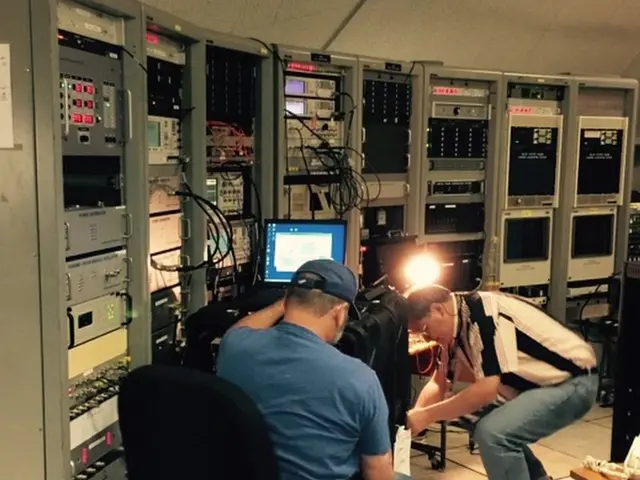Energy Ministers of various states confer with the Federal Minister, Reiche, in a significant meeting. - Energy Ministers from Various States Confer with Federal Energy Minister
State Energy Ministers Convene in Rostock-Warnemünde for Energy Transition Discussions
State energy ministers are meeting with Federal Minister of Economics, Katherina Reiche, for the first time today in Rostock-Warnemünde. The gathering follows the Energy Ministers' Conference, where Reiche's proposal for new gas-fired power plants has stirred debate among environmental organizations and the Greens.
As the central issue of the conference, the further development of Germany's energy transition is under scrutiny. Mecklenburg-Vorpommern's Minister of Energy, Wolfgang Blank, underscored the importance of intelligent and fair promotion of renewable energy expansion, engaging citizens, and bolstering the German economy's competitiveness.
Schleswig-Holstein's Energy Minister, Tobias Goldschmidt (Greens), called for continued joint efforts in renewable energy expansion. He highlighted the progress made in recent years, which not only benefited the climate but also helped the country navigate the energy crisis brought about by Russia. Goldschmidt emphasized the need for the Energy Ministers' Conference to signal unwavering commitment to the energy transition.
The conference comes at a critical juncture as Germany seeks to strike a balance between industry needs, energy affordability, and net-zero climate targets. Minister Reiche is championing a pragmatic approach that prioritizes security of supply, affordable prices, and sector decarbonization.
Reiche has also begun reviewing the electricity system's transformation and possible adjustments to expansion targets. A future electricity demand review is forthcoming before the summer break, which will inform revised solar and wind targets, taking updated forecasts for 2030 demand into account.
Environmental organizations are at odds with the proposed new gas plants, arguing they could undermine the goals of the energy transition and climate protection. Advocates for renewable energy are pushing for faster wind and solar energy deployment, improved storage solutions, and lower costs for citizens and businesses. Rapid implementation of auctions for new gas capacity could begin as early as 2026.
The conference underscores Germany's multi-faceted approach to its energy transition, with Reiche's practical focus on securing supply, lowering costs, and collaborating with European partners. Other initiatives include a system review, European cooperation, cost reductions, and the introduction of a new law on carbon management (CCS/CCU). The gathering marks the commencement of Reiche's leadership in the Energy Ministers' Conference, with a focus on grounding Germany's energy transition in technical and economic realities.
- Minister Reiche's proposals for new gas-fired power plants have sparked discussions among environmental organizations, such as those focusing on sciences like environmental science, as they worry about the impact on climate-change, the environment, and the progress of Germany's energy transition.
- In her pragmatic approach to the energy transition, Minister Reiche is also looking into the future of the electricity system by reviewing the transformation process and considering possible adjustments to expansion targets, including those for renewable energy like solar and wind, with the aim of lowering costs for citizens and businesses.
- State energy ministers' discussions in Rostock-Warnemünde are not only focused on Germany's domestic energy transition and industry needs, but also on the country's role in the European market, as it collaborates with other EC countries to achieve net-zero climate targets, foster economic competitiveness through industries like finance and energy, and promote science and technology advancements in sectors like renewable energy and carbon management.







